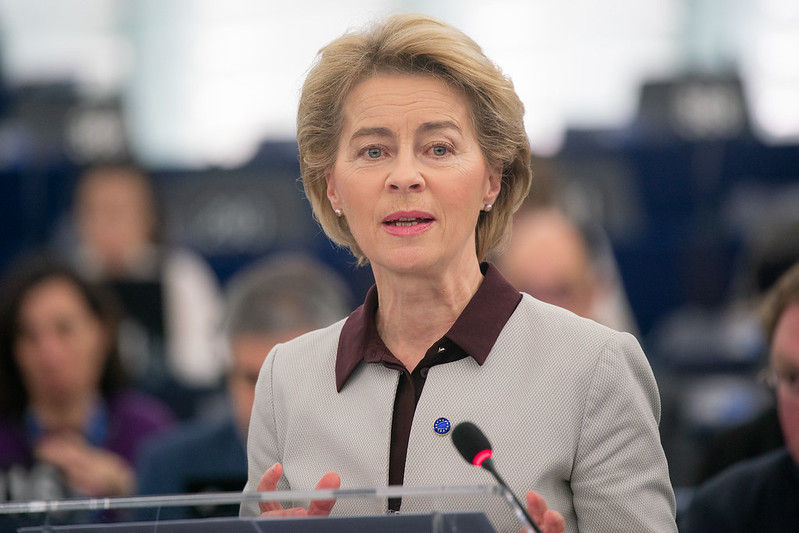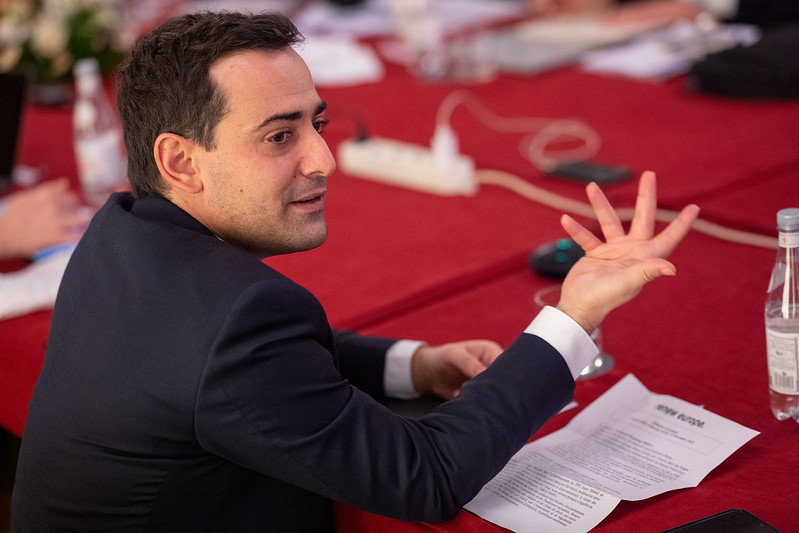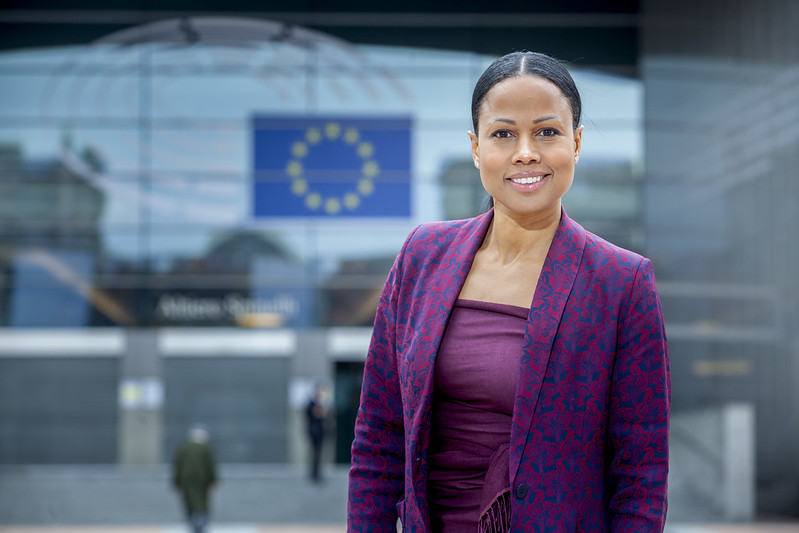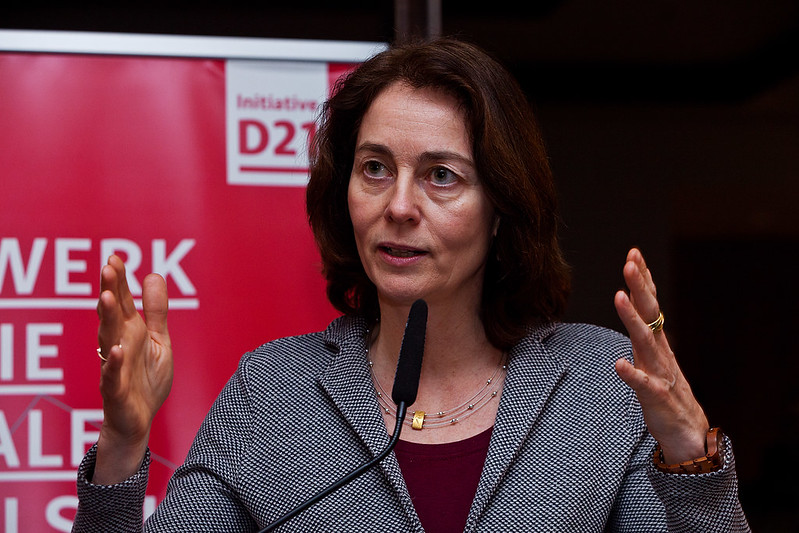- Julian Plottka, University of Passau / University of Bonn
- Sophie Pornschlegel, European Policy Centre, Brussels
- Manuel Müller, University of Duisburg-Essen / Der (europäische) Föderalist, Berlin
Manuel
In the European Parliament, the second half of the parliamentary term has just begun: it’s only two and a half years until the next European elections! And even though in reality it’s much too early for that, we want to use this occasion to venture a few speculations. Who will the European parties put forward as their leading candidates in 2024, and who will become the next Commission president?
Today’s quartet (or rather tercet, since Carmen unfortunately had to cancel at short notice) is inspired by the primary drafts of the US blog FiveThirtyEight. In four rounds, we will take turns in naming politicians who could be nominated as European leading candidates (by any party) in the next election. No name may be picked twice – so in total we’ll be talking about twelve possible candidates. The winner is whoever names the most real 2024 leading candidates. A bonus point goes to who picks the actual next Commission President.
To make sure everything is fair, I have determined our order using a random generator: Julian, Sophie, Manuel. The second and fourth rounds are in reverse order. And off we go! 🏁
Ursula von der Leyen (EPP)
Julian
My first pick is Ursula von der Leyen.
Manuel
Well, that’s not a big surprise.
Julian
In my opinion, three things speak for her:
- The EPP is currently not fully behind the concept of the leading candidates.
- For the CDU, a German leading candidate is the only (halfway) realistic chance of being represented in the next Commission.
- According to the coalition agreement, she would also have the grudging support of the German traffic light coalition.
Sophie
… as long as Ms von der Leyen’s mobile phones from her time in the German Ministry of Defence and the text messages she exchanged with the heads of the pharmaceutical companies during the Corona crisis don’t turn up. But leaving that aside: to me, it also seems realistic that von der Leyen will be the EPP’s leading candidate in the next European elections.
Julian
And if the scandal happens to break during the electoral campaign, that could at least boost media coverage of the election. 😉
Manuel
I also think that von der Leyen is an obvious candidate. If she wants to have a second term and no scandal intervenes, I can hardly imagine that the EPP will nominate someone else. A year ago, there was some criticism of her style of government in connection with the Corona vaccine procurement. But even José Manuel Durão Barroso got a second term as Commission President at his time.
Sophie
And if you compare the two, I prefer a second term for von der Leyen. Despite all the criticism last year, in retrospect she has achieved quite a lot as Commission President, especially in view of the Corona crisis that has overshadowed everything. We now have the recovery fund; and the
Digital
Markets Act and Digital Services Act and the Fit for 55
climate package are important legislative projects. As so often, I would rather
criticise the governments in the Council for not coordinating enough during the crisis and for continuing to block many things.
Manuel
In any case, for the EPP von der Leyen could also be an easy way out of the question of how much you want to fight for the leading candidates process. If she wins as a leading candidate, the European Council would simply nod off her re-election, and a
new institutional conflict could be avoided.
However, things might get interesting if the EPP is not the strongest force in the European elections and von der Leyen does not have a majority in Parliament, but the European Council nominates her anyway – arguing that she was a leading candidate after all. That would certainly bring us back to discussing what exactly is the meaning of the “leading candidates procedure”.
Julian
I’m also not sure whether von der Leyen would do the leading candidates principle any good. I’m afraid that the election campaign would only reveal her lack of public visibility as Commission President and offer Eurosceptics a great opportunity to turn the European elections into a vote against the EU.
Stéphane Séjourné (RE)
Manuel
Let’s move on. Sophie, what is your first pick?
Sophie
I think that Stéphane Séjourné, the current leader of Renew Europe and “protégé” of Emmanuel Macron, will be the leading candidate for the Liberals. In the last European elections, Renew Europe still rejected the leading candidate procedure and instead proposed a team of seven people. But if Macron can now position Séjourné as his person, then I think they could agree on him.
Of course, this scenario assumes that Macron remains President of France after the national elections in April. If not, then I could also imagine Macron trying to become Commission President himself.
Julian
I also had Macron on my list for Renew if he is not re-elected. I think he has traction as a person. But I am a bit skeptical as to whether he is strong enough within the ALDE to be able to push through a protégé.
Manuel
Séjourné has certainly made an impressive rise in the European Parliament – from a largely unknown newcomer to the leader of the parliamentary group. But I also see the problem that his and Macron’s LREM party is only a member of the parliamentary group Renew Europe, not of the associated European party ALDE. It will be interesting to see if they can get the ALDE to nominate a “group leading candidate” instead of a “party leading candidate”.
Macron himself seems less likely to me. If he loses the presidential election, he’ll be gone, don’t you think?
Julian
He’s a little young for that, isn’t he? He probably won’t go to the Delors Institute as a researcher now. And I can’t imagine that a French President who has been voted out of office will try to run again at national level.
Sophie
That’s a good point about the ALDE, Manuel – but the European parties won’t be so powerful by 2024 that they can assert themselves. I assume that in practice it is ultimately the national parties within the parliamentary groups who will decide who becomes the leading candidate.
Julian
Yes, although: If the liberal parties at the national level have an interest in the position, the Renew-is-not-ALDE argument would of course be opportune to keep out unwanted French competition. The only question is whether there will be that much battle anyway.
Sophie
I would also say that Macron will continue to hold a position of power if he loses the presidential election. In my view, he is not only pro-European out of opportunism. The post of Commission President would therefore be an interesting career option for him.
Enrico Letta (PES)
Manuel
Here comes a possible PES leading candidate: Enrico Letta, currently leader of Italy’s Partito Democratico. He was national Prime Minister in 2013/14, so he has the necessary pedigree for the European Council. Moreover, he never lost an election (at the time he was ousted in an intra-party cabal by Matteo Renzi), and he is doing reasonably well in the polls at national level: under his leadership, the PD has stabilized as the strongest single party, even if the right-wing camp, consisting of FdI (ECR) and Lega (ID), is clearly ahead overall.
In 2023, Letta is likely to run for Italy’s prime minister, but has little chance of actually being elected. After that, EU leading candidate could be an obvious next career step for him. All the more so because he is interested in European politics, dreams of a “United States of Europe” and (unlike Macron) has actually been President of the Jacques Delors Institute.
Julian
That would fit well with the narrative of Italy’s transformation and would be a symbolic acknowledgment of current Italian politics, so I can imagine an Italian having a good chance of being nominated in the European Council.
However, you’re contradicting yourself a little when you say that he’s never lost an election, but then assume that he will do so in 2023. 😉 That could be a flaw after all.
Sophie
Yes, that seems like a possibility to me. However, I am not sure that he would make a good Commission President. For me he is the epitome of a European politician from the “bubble” – his station at the Jacques Delors Institute in France makes that clear. He is certainly a candidate that the EPP would also be happy with, but given that the Commission needs a strong figure to hold its own against the Council, I don’t know if he would be the right person. It is important that the next Commission President has a vision (such as the “United States of Europe”) but also a realistic plan to move the institution and the EU as a whole forward.
Julian
However, in
recent years it was rather the
Commission Presidents who did not come out of the bubble who were
close to the European Council. In terms of the Commission
representing the supranational interest, I don’t think someone from
the bubble is all that bad. In addition, having
some EU experience makes it a lot easier to
get the “shop” under control internally.
Manuel
I also think that Letta actually embodies this combination of vision and pragmatism quite credibly. I see as his main weakness that his federalist leanings could be a red rag for some in the European Council. And if a right-wing coalition takes over in Italy in 2023, he could probably not expect any help from his own national government either.
In order to really become President of the Commission, he would therefore need a lot of support from the European Parliament. But I wouldn’t rule out that he might succeed. In any case, he has experience in building cross-party consensus from national politics.
Sophie
Manuel, we won’t agree on that – for me, Letta is the epitome of a Brussels compromise and represents a squad of politicians who do not have the traction to make Europe stronger in the future. I’d rather have a Macron than a Letta!
Julian
That sounds like a letter of recommendation for Letta to make him palatable to the skeptics in the European Council. 🙃
Alice Bah Kuhnke (EGP)
Manuel
In any case, Letta vs. Macron would be a remarkable pairing … But let’s get on with it. I start round 2 with a possible Green leading candidate: Alice Bah Kuhnke. She was Minister of Culture in Sweden from 2014, was elected to the European Parliament in 2019 and is vice-president of the Greens/EFA parliamentary group. Recently, the group nominated her as a candidate
for President
of the Parliament, which could be
understood as a signal for 2024.
Moreover, Bah Kuhnke would be the first leading candidate with a migration background – her father comes from Gambia. This could be a strong symbol for the Green electorate. And: Bah Kuhnke’s national party is very close to the four-percent threshold in Sweden. A little tailwind from the leading-candidates effect could come in very handy here in terms of electoral tactics.
Julian
I agree with you! Under the premise that Ska Keller does not run for a third time, I believe above all that Bah Kuhnke has very good chances within the party. In addition, during the Weber vs. Stubb campaign in 2013 we already had a discussion as to whether it shouldn’t be the Nordics’ turn now.
As a media expert, she also covers a topic that the EU will continue to work on and that fits well with the Greens if you look at it in the context of democracy and the rule of law. And in Sweden she was not only Minister of Culture, but also for Democracy.
Sophie
In general, I think she’s a very good candidate. Of course, it is very unlikely that the next Commission President will be a member of the Greens – even if they are very strong in terms of content and have many young and dynamic people in the European Parliament.
Julian is also right that the Scandinavian countries have not been particularly well represented in the top EU positions. However, one must also not forget that they are relatively Eurosceptic and that Sweden, for example, is not part of the euro zone either. All in all, Bah Kuhnke therefore has little chance of becoming Commission President. But she would definitely enrich the election campaign and would also be a refreshing face compared to the otherwise often somewhat boring candidates.
Manuel
Fine, we have a consensus then – at least for the Greens. 😄
Viktor Orbán (far right)
Sophie
So let’s go to the far right. I’m going out on a limb here, but assuming Viktor Orbán loses the April 3 elections and Péter Márki-Zay becomes Hungary’s new prime minister, I imagine Orbán would put himself forward as the leading candidate in 2024. After all, he has a very clear line on European policy – a Christian Europe of sovereign states. This distinguishes him from many of his colleagues on the far right.
Since Fidesz was kicked out of the EPP, he would set up a new right-wing European party for this. His current justice minister, Judit Varga, would pull the strings in the background.
Manuel
Wow, now it’s getting exciting! But that part with setting up a new right-wing European party will be quite a challenge for Orbán. His plan for a unified right-wing group in the European Parliament turned out a blow in the water. And with the current Ukraine crisis, the question of how to deal with Russia and the Putin government has become very salient – a topic on which the European far right notoriously disagrees. The relationship between Orbán and the Polish PiS (ECR), his most important European ally, has already suffered as a result.
Sophie
In principle, it wouldn’t be a bad thing if Orbán didn’t make it. But unfortunately I believe that the far-right parties have enough understanding of power politics to recognize when it helps them to found a common party. And I totally agree with you on Russia – but I don’t think this crisis will stay as salient as today until 2024.
Manuel
Not until 2024, but maybe until summer. And if Orbán loses the national parliamentary election, he needs a quick comeback.
Julian
I’m also a bit skeptical whether he’ll try that. First, I agree with Manuel that his chances are pretty slim. Just look at it from the point of view of the ECR: should they disband themselves only in order to help initiate an Orbán show?
Second, he has little to gain. I don’t think he’ll want to take on the role of an MEP – and that’s all there is in it for him if he becomes a leading candidate. Also, if Fidesz fails at the Hungarian election, someone has to organize the blocking of national democratic reforms. They will definitely need him as a gray eminence there.
Manuel
What the ECR will do in the European elections is also interesting in other respects: in 2014 they didn’t have a leading candidate at all, in 2019 they put forward the well-connected but little-known Jan Zahradil. In comparison, Orbán would at least attract more public attention. But he might also get that without formally being a leading candidate.
Julian
And ending up with the ECR could give him a little more centre-right appearance. Actually, from his point of view they might have been a good replacement for the EPP, but he should have gone there voluntarily and not as a supplicant after being kicked out.
Sophie
Julian, didn’t Fidesz leave voluntarily? Officially, they were not kicked out after all …
😉
Katarina Barley (PES)
Julian
With my next pick, I would like to remind you that the leading candidates principle was always an event dominated by German speakers. So I guess it will come down to a face-off between von der Leyen and Katarina Barley.
Manuel
😂
Julian
Remember that the SPD still has to do something to wrest the commissioner post from the Greens. Besides, this would be a nomination in the tradition of Martin Schulz: for Europe, but little distinguishable from other political parties.
Sophie
That is an important point there – the leading candidates question is still a rather German debate about Europe.
Manuel
Well, but a candidacy 🇩🇪 vs. 🇩🇪 ... Did someone say “reluctant hegemon” here?
Sophie
Nooooooo. Never!
Julian
No, because you don’t think it’s realistic or no, not Barley, please?
Sophie
No to “reluctant hegemony”: because Germans don’t want to admit that they have too much power in Europe, that they sit in their leadership position, but don’t do much with it – because that is exactly what serves German interests, but nobody would ever admit it publicly. And then, Germans still see themselves as the “exemplary Europeans”, which then quickly turns into a narrative of “better Europeans”.
Julian
To quote
Volker Kauder: “Europe is speaking German now.”
Manuel
Honestly, I don’t think the PES will nominate a German candidate. Sure, the SPD might have good reasons to want that. But Barley is far from having the position within the European party that Martin Schulz had in 2014. And in terms of electoral strategy, it makes more sense for the PES to appeal to a broad geographical spectrum than to turn this European election campaign into an all-German leading candidates duel.
Sophie
I don’t believe that the PES will nominate Barley either. She was sent to Brussels in 2019 because the SPD apparently had no other candidates who knew enough about Europe. That says a lot about the SPD’s position on European policy.
Manuel
Well, the SPD also had Udo Bullmann in 2019, who was even the leader of the S&D parliamentary group. But hardly anyone in the German public knew him, and that’s why the national party leadership thought he wasn’t suitable for the election campaign.
Sophie
Yes, that’s exactly what I mean – no European politicians who have enough profile.
Julian
The SPD and European politics is indeed an exciting topic. On the one hand, since the days of Martin Schulz there has not been a party leader with a clear commitment to Europe. On the other hand, there are so many pro-Europeans in the party that they have managed to overtake the CDU in terms of European policy. And that profile fits Barley. That’s why I do believe that she and the SPD
will try.
Rutte, Marin, Meloni
Manuel
To finish, two lightning rounds in which we only
mention the names, but don’t comment them in detail. Julian, it’s
your turn again.
Julian
OK. In the first quick round, I throw in the non-leading-candidate Mark Rutte. I think he has a strong profile in EU politics as a representative of the “frugal four” or “transformative five”. But if he becomes Commission President, he will go through the European Council without being a leading candidate.
Sophie
I’ll continue – also with one of the “frugal five”, but for the Social Democrats: Sanna Marin from Finland. She is still young, has government experience and represents a small country that has a lot of practice with coalitions – and as we all know, that is particularly important in the EU.
Manuel
Hey, Sanna Marin is who I wanted to say next! 😠 Although a possible candidacy of hers will depend heavily on how the Finnish parliamentary elections go next year.
Well, then another Italian instead – this time from the far right: Giorgia Meloni, currently party leader of both the national party FdI and the European party ECR. Meloni will try to become Italy’s prime minister in 2023, but if she fails, she will have to reinvent herself. A second career at the European level might be a way out then.
Eickhout, Dombrovskis, Kurz
And because it’s my turn again, here’s another Green, too (the EGP will surely have two leading candidates again – that increases the chances of a correct pick): Bas Eickhout, who was already a leading candidate in 2019, could run again. In fact, it has almost become a tradition among the Greens to change only one of their two co-leaders in each electoral term, both regarding the parliamentary group presidents and the leading candidates.
Sophie
Another potential candidate for the EPP: Valdis Dombrovskis, currently Executive Vice-President of the Commission and Commissioner for Trade. He has quite a lot of power in the von der Leyen Commission, comes from a small country and is very capable of compromise – not a great rhetorician, but someone who knows Brussels very well. Of course, he would only be a leading candidate if von der Leyen does not run again.
Manuel
Dombrovskis would certainly be a plausible candidate if one prioritises acceptance by the European Council over charisma and public visibility.
Julian
Or Sebastian Kurz could use the European elections to make a comeback to the political stage. If he gets at least a half-baked acquittal in Austria by 2024, he would certainly be a candidate capable of achieving a majority within the party. And in terms of publicity, he is not completely lost even without manipulating polls.
Manuel
Ha – Julian ends this with a political fiction scenario! But if you have a von the Leyen in your team, you can probably also afford a Kurz. 😉
So, here are our final line-ups:
| Julian | Sophie | Manuel |
| Ursula von der Leyen | Stéphane Séjourné | Enrico Letta |
| Katarina Barley | Viktor Orbán | Alice Bah Kuhnke |
| Mark Rutte | Sanna Marin | Giorgia Meloni |
| Sebastian Kurz | Valdis Dombrovkis | Bas Eickhout |
We will see who has the most hits in 2024. The symbolic award ceremony will take place during the first European Policy Quartet after the European elections – stay tuned! 🏆
Julian Plottka is a research associate at the Jean Monnet Chair of European Politics at the University of Passau and at the University of Bonn.
|
Sophie Pornschlegel is a Senior Policy Analyst at the European Policy Centre in Brussels.
|
Manuel Müller ist a postdoctoral researcher at the University of Duisburg-Essen and runs the blog „Der (europäische) Föderalist“. |
- Kann die Konferenz zur Zukunft Europas noch ein Erfolg werden? [DE] ● 10 March 2021
- What’s up with the Conference on the Future of Europe? [DE / EN] ● 25 August 2021
- Which priorities should the Conference on the Future of Europe focus on? [DE / EN] ● 21 October 2021
- Who will be the leading candidates in the 2024 European elections? [DE / EN] ● 14 February 2022
- What does the Ukraine war mean for the EU? [DE / EN] ● 31 March 2022











Keine Kommentare:
Kommentar veröffentlichen
Kommentare sind hier herzlich willkommen und werden nach der Sichtung freigeschaltet. Auch wenn anonyme Kommentare technisch möglich sind, ist es für eine offene Diskussion hilfreich, wenn Sie Ihre Beiträge mit Ihrem Namen kennzeichnen. Um einen interessanten Gedankenaustausch zu ermöglichen, sollten sich Kommentare außerdem unmittelbar auf den Artikel beziehen und möglichst auf dessen Argumentation eingehen. Bitte haben Sie Verständnis, dass Meinungsäußerungen ohne einen klaren inhaltlichen Bezug zum Artikel hier in der Regel nicht veröffentlicht werden.